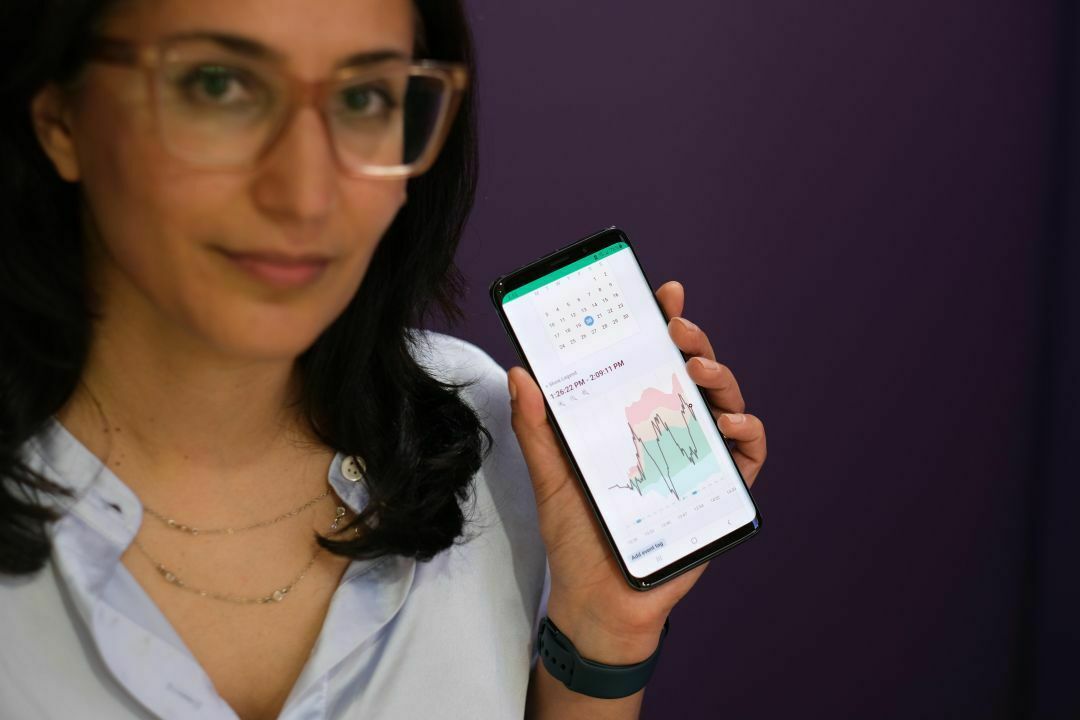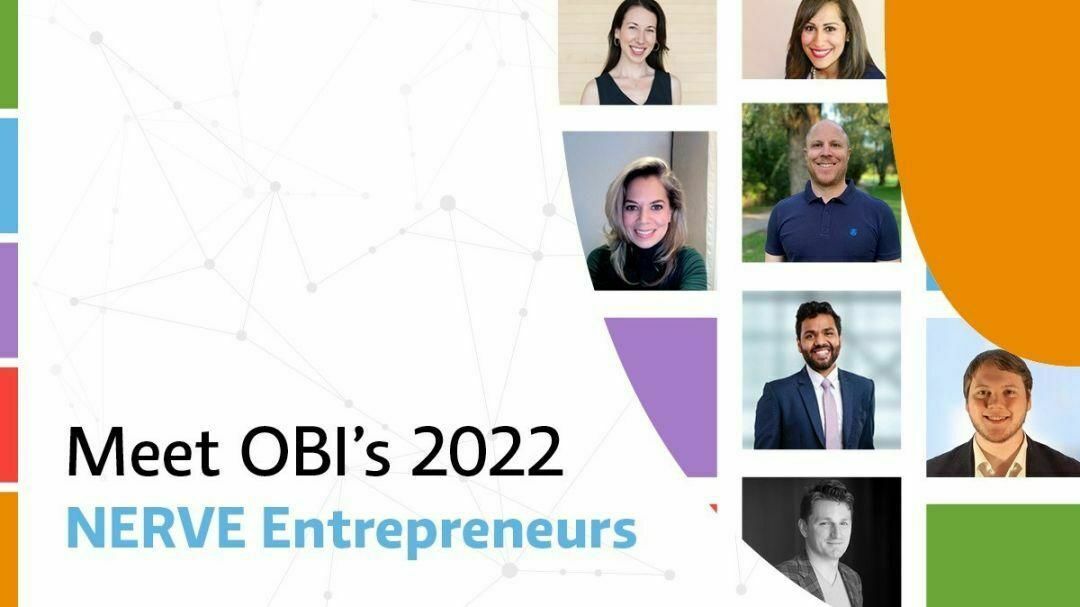Investing in Brain Health
More StoriesOBI partners with research and industry to coordinate the commercialization of brain-related technologies. Through access to funding and support, OBI helps bridge the funding gap between ideation and commercialization for neurotech companies in the province.

The Honest Broker
How many researchers does it take to create a new diagnostic tool? This is not a joke, more like a conundrum faced by the research system. Many partners are involved in helping bring research from the bench to bedside, or as OBI commonly says, ‘from lab to life’. To truly advance care, we require researchers and clinicians, patients and families, and innovators and companies.
But who connects these people and how does evidence and knowledge shuttle between these parties in the innovation process? OBI is built to do that, playing the role of an ‘honest broker’ or trusted intermediary that brings these groups together, and creating ways to address the challenges facing the brain health community. One approach used by OBI is to support neurotechnology companies using open-sourced, secure data to promote discovery, enhance neuroscience research, and, ultimately, help improve the brain health for people living in Ontario.
Winterlight Labs, an OBI portfolio company monitoring cognitive impairment and mental health through speech algorithms, used a dataset from Brain-CODE, OBI’s neuroinformatics platform. The data are from a long-term dementia study on over 130 people, led by Dr. Sandra Black, senior scientist at the Sunnybrook Research Institute. Brain-CODE was used as a ‘safe’ workspace where patient data could not be re-identified, and where the Winterlight Labs proprietary algorithms would not be divulged. In this space, Winterlight Labs was able to refine and validate their speech recognition algorithm.
“Being able to access these large datasets of patient voice records has allowed us to analyze and compare speech and identify distinct characteristics that can lead to earlier diagnoses of cognitive impairment” says Winterlight co-founder Liam Kaufman. “Without the Ontario Brain Institute’s neuroinformatics platform, we would have been missing key data, making it extremely difficult to come to our findings.”
Working through Brain-CODE allowed Winterlight to access data that would otherwise be unavailable to them. It created a space where Dr. Sandra Black and the Sunnybrook team trusted that the data would only be used for the intended purpose. A purpose that aligned with the original participant's consent and was approved by their research ethics board.
“We are delighted that this OBI-Winterlight-Sunnybrook collaboration has been so fruitful,” said Dr. Black. “I particularly thank our research psychometrists, with special mention of Morgan Koo, the research coordinator who worked so diligently on these legacy recordings from our previous aphasia studies in patients with stroke and dementia at Sunnybrook’s L.C. Campbell Cognitive Neurology Unit. These recordings provided ground truth for the machine learning software that has contributed to the Winterlight’s success, pioneered by Liam Kaufman – my former grad student. I am very pleased at his success in moving this forward as a diagnostic aid in Alzheimer’s Disease and other conditions.”
Since this partnership has ended, Winterlight has forged new partnerships and created exciting opportunities to spread their impact within the dementia and mental health spaces. In January 2023, Winterlight Labs was acquired by Cambridge Cognition for £7 million (approximately $11.8M CAD).
See the poster presentation that resulted from the partnership. Next up: the team is preparing a manuscript to publish the findings in a peer-reviewed journal.

From the Lab to the Living Room
What are the most effective ways to support children with effective emotion regulation strategies? Five years ago, this was one of the top 10 community priorities emerging from a exercise led by the Province of Ontario Neurodevelopmental Network – or POND, an OBI Integrated Discovery Program – that asked neurodivergent individuals, their families, and health care providers across Ontario to share their priorities for supporting neurodivergent communities.
Difficulties with emotion regulation are very common in neurodevelopmental conditions. And yet, our ability in supporting kids to develop effective regulation skills remains limited. To address this gap, the POND network and its partners at Holland Bloorview Kids Rehabilitation Hospital's Bloorview Research Institute (BRI) have made huge strides by developing and testing a promising new technology called hollyTM. This technology helps kids be aware of their big emotions. The best part? The testing is happening at home and in the community to better assess how well it works in the real world. This is funded through a new OBI initiative called CORTEX (COmmunity-based Real-world neuroTech EXperience for accelerating adoption).
The project, co-led by Dr. Azadeh Kushki and Dr. Evdokia Anagnostou, scientists affiliated with the BRI and the University of Toronto, as well as with POND, is called ‘A Community Trial of hollyTM for Pediatric Populations in a Naturalistic Setting.’ hollyTM is a clinically validated algorithm that uses a smart watch to measure real-time heart rate to understand what is happening inside the body. hollyTM provides children and their caregivers with a visual display showing how strong their feelings are so they can be aware of their emotional levels and manage them when needed. The project looks at the feasibility of using hollyTM in real world settings like home and school. The research team is asking families to provide feedback to make sure that using hollyTM is meaningful for them. They are also looking to see if hollyTM works well or doesn’t work well for certain types of needs.
This year, 100 children and 100 parents will be recruited to take part in this project with results to be published next year. So far, the families’ feedback has given the research team insights that have enhanced several features of hollyTM. “The partnership with families has given us invaluable feedback to ensure that hollyTM meets the needs of the children and their caregivers in supporting positive emotion regulation outcomes,” says Dr. Kushki.
The results seem promising and will surely help this novel technology navigate the path towards adoption. If successful, hollyTM will emerge as a new tool to help kids and their parents manage big emotions and reduce emotional outbursts, one of the top shared priorities of children and families. Although research can take a lot of time to translate from bench to clinic to bedside, CORTEX is providing a shorter path by taking it from the lab to the living room.
Learn more about the hollyTM project.
Photo by Qin Dai (Institute of Biomechanical Engineering, University of Toronto)

NERVE: Nurturing the province’s neurotech cluster
By growing Ontario’s neurotechnology sector, OBI is ensuring that innovation and quality care for people with brain disorders thrives. Formerly known as ONtrepreneurs, the Neurotech Entrepreneurship to Validate Emerging Innovations (NERVE) program was expanded in 2022 to reach entrepreneurs outside Ontario and across Canada. NERVE provides $100,000 in funding to awarded Canadian-based entrepreneurs in addition to 12 months of training opportunities, one-on-one mentorship, and support in order to help kick-start neurotech ventures.
The 2022 NERVE award recipients are a strong indicator of how investing in emerging talent can produce real-world technology to better the lives of the one in three people in the province living with a brain disorder.
The seven members of the cohort are:
- Gavin Brauer of Pearl Interactives
- Geoff Frost of Raft Digital Therapeutics
- Sarah Lambert of Ora Medical
- Kramay Patel of nEureka
- Michael Perreault of Eyful
- Nardin Samuels of Cove
- Alison Smith of Roga
“As part of the 2022 NERVE cohort, our team at nEureka is excited to take major steps towards realizing our vision of redefining chronic epilepsy care,” said Kramay Patel. “Thank you, Ontario Brain Institute, for this generous support.”
There have been many successes from the NERVE cohort this year, including a feature from Roga’s Alison Smith discussing solutions to stressors beyond medication and cognitive behavioral therapy in Forbes. Cove’s Nardin Samuel was impressively listed in the Top 100 Most Powerful Women in Canada WXN, and Pearl Interactives released Bootle Band, their mixed reality music tool for children of all abilities to promote play, learning, and wellness. To date, the app has already been downloaded more than 550 times.
"Ontario has established itself as a global leader in producing remarkable neurotech innovations that support people living with brain disorders. Given the success that we witnessed for a decade through our provincial program, it has been our distinct pleasure to open up to entrepreneurs across the country” says Dr. Tom Mikkelsen, President and Scientific Director of the Ontario Brain Institute. Learn more

Follow-on successes: Commercialization efforts amplified
Neurotechnology entrepreneurs continue to garner follow-on investment after they receive financial and mentorship support from OBI’s commercialization programs.
Last summer, Spiderwort – a portfolio company working to treat acute spinal cord injuries through a biotech process that facilitates the growth of new tissue, announced the completion of a $13.2 million USD (or $18.9M CAD) financing round, led by Horizons Ventures and supported by K5 Global, BoxOne Ventures and Break Off Capital. This investment will support a transition from pre-clinical studies to clinical trials that will be critical in bringing Spiderwort’s revolutionary plant-derived biomaterials to market.
“We are grateful for the trust and support from our funding partners and investors. We are looking forward to continuing our journey with them,” said Dr. Charles M. Cuerrier, CEO of Spiderwort. “With the closing of this financing round, we are now in position to accelerate our product development program to bring [our products] closer to patients.” More
In September, OBI-backed DAMONA Pharmaceuticals completed a $5.5M USD (close to $7.5M CAD) seed stage financing round in support of its lead therapeutic for the treatment of cognitive symptoms associated with depression and diseases of aging. The investment was co-led by the Angelini Lumira Biosciences Fund and Noetic Fund and included participation from Toronto Innovation Acceleration Partners and several family offices. In addition to the equity financing, the company also received significant follow-on financial support from the Centre for Addiction and Mental Health.
"We are grateful for the support from all of our investors and supporters who have brought us to where we are today," said Dr. Etienne Sibille, Interim CEO and Chief Scientific Officer of DAMONA. " We look forward to working with our new partners and utilizing the capital from this financing to complete our pre-clinical studies and take our program to the clinic. More
And just this spring, Diamond Therapeutics Inc., a portfolio company focused on low-dose psychedelics for use in the treatment of mental health, finalized a strategic investment round led by First Avenue Ventures Life Science Fund I, which supports early-stage drugs, therapies and devices in development at the University of Alabama at Birmingham (UAB). Proceeds from the investment will support Diamond Therapeutics’ collaboration with UAB on a clinical trial of low-dose psilocybin to treat demoralization - discouragement, hopelessness or extreme helplessness.
Judy Blumstock, CEO and Founder of Diamond Therapeutics said: “There are no other studies examining the effects of psychedelics on demoralization. The fund's support will help advance our work to the next level, bringing us closer to our goal of offering patients new and better treatments." More
